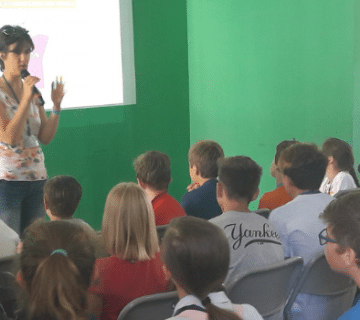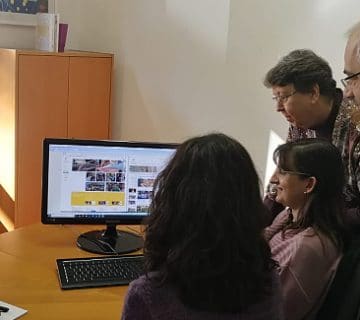 The mass-media is that wonderful phenomenon familiar to all of us and in a sense characteristic of our times, but also because the media have always been closely associated with and fundamentally important to our Movement. I had the opportunity to underline this in a discourse in Bangkok, Thailand, in January, 1997 when the prestigious St. John’s University conferred upon me and, through me, upon the Movement I represent, an honoris causa degree precisely in the science of social communications.
The mass-media is that wonderful phenomenon familiar to all of us and in a sense characteristic of our times, but also because the media have always been closely associated with and fundamentally important to our Movement. I had the opportunity to underline this in a discourse in Bangkok, Thailand, in January, 1997 when the prestigious St. John’s University conferred upon me and, through me, upon the Movement I represent, an honoris causa degree precisely in the science of social communications.
In fact, a double affinity profoundly links the communications media to us and prompts us to speak of them. There is first of all an affinity in relation to goals.
The goal of the Focolare Movement is to contribute toward accomplishing what our young people describe as the dream of a God, that is, the heartfelt request that Jesus made to the Father shortly before he died: “May they all be one” (Jn. 17:21).
What is the purpose of the media? The collective sense of their vocation is clear: they too are aimed at helping people to live together.
But it is not only the purpose for which the Movement works that makes the media so close to our life. There is a second affinity, related to its method: the spirituality of unity, characteristic of the Movement, is lived not only in a personal dimension, but in a communitarian, collective dimension. In the birth and development of the communications media we can discern a new step in the evolutionary process of humanity. This development introduces an irreversible thrust, so to speak, from complexity to oneness, from fragmentation to the search for unity in real time.
In examining our spirituality we realize that precisely because it is the way of unity, it is a way of communion.
In a world pervaded by individualism, in a Church which fostered and proposed traditional, though always admirable individual spiritualities, the Holy Spirit impelled our Movement, twenty years before the Council, to change direction and make this very decisive move towards our neighbors.
This is not the moment to give you an in-depth analysis of the key ideas upon which our spirituality is based, but we can affirm that in each one of them there is a clear communitarian dimension. It is a collective way. We go to God through our neighbor, or better, we go to God with our neighbor, with our brothers and sisters whom we love.
And because this love is reciprocal, it is possible to pattern our lives on the life of the Trinity, becoming one as God is one, without ever being alone, as God who is triune. And Christ is in our midst, as he promised: “Where two or three are gathered together in my name, there am I in the midst of them” (Mt. 18:20).
This spirituality gradually proved to be a spirituality of the people. It is the animating spirit of an evangelical revolution of love capable of spreading quickly all over the world. And not only among Catholics, but also among Christians of other Churches, among faithful of other religions, among men and women of good will who aspire to a more united world. It is a phenomenon of universal brotherhood among millions of people, present now in 184 nations and animated by a deep need: to feel that they are “one” with all.
This thirst to feel united has always been a characteristic of ours, from the very early days, when a constant exchange of letters put the work God was beginning to do within each one of us into communion. And this work of God became evermore fruitful as it was shared with others. …
The Movement has had an official web site on Internet, where ideal contents are presented, as well as the history and spreading of the Focolare with links to similar sites of other nations and pages of updated news. …
As we said, our use of the media was born from concrete needs, from simple circumstances, like the desire to keep in touch or the need to update those who were not present for certain events we felt were important, or from the responsibility to give spiritual support to those in difficulty.
For many years we did not publicize the Movement or its exciting spread. Even now publicity does not come so much from the Movement itself but spontaneously from circumstances.
Above all, we want everything to keep on flourishing from life, even though we are ever more convinced that the communications media are, so to speak, made especially for us, given their vocation to the unity of peoples. Besides, the early Christians did not have the media. They had their hearts overflowing with the message of Christ, and they passed it on by word of mouth to such an extent that, as Tertullian said, although they were born yesterday, they had already invaded the world. Jesus used words, he spoke; the Gospels don’t speak of him writing down anything, expect when he wrote on the ground (cf. Jn. 8:6).
If we take a quick glance at the modern communications media, we cannot hide the fact that, along with a rapid development which makes them increasingly more useful and fascinating, they present a series of new and weighty problems for society, families and individuals. Therefore, it is a panorama of lights and shadows.
To cite only a few of these problems: there is globalization which leads to a leveling of cultures suffocating their inherent riches; ethical relativism which mixes authoritative messages with others that are superficial or biased; sensationalism, at the cost of intruding upon the suffering and privacy of others; an exaggerated atmosphere of competitiveness within the productive structures of the communications media; excessive intrusiveness on the public… How can we use the media without being used by the media?
Lights and shadows, I said… in some cases, the media today are dogmatically accepted without an attitude of objective criticism; in other cases, they are blamed for the amorality, violence, and superficiality they propose; and in still others they are over-estimated as infallible instruments of power, almost as new idols of a humanity which has lost other certainties. We know that they are simply means, but we want to appreciate this “sleeping giant of potential evangelization”[1] according to a well-chosen expression of the Pope, and we invite everyone to use them well, faithful to the prophetic message they contain.
The message is one of “unity”. At this point I would like to raise a prayer of thanksgiving to God for the way he is present even in modern discoveries and new technologies, for the way he leads history.
At the very moment in which humanity seems to be wandering in the dark after the fall of strong ideologies and the blurring of many values, at the very moment in which there is a longing for a more united world and a demand for universal brotherhood, at this very moment we find ourselves equipped with these powerful means of communication, a sign of the times which says “unity”. Can we not see the hand of God in all this?
[1]. John Paul II, Address to Bishops’ Conference of Poland, February 14, 1998, in L’Osservatore Romano, Weekly Edition in English, March 4, 1998, p. 8.


 Italiano
Italiano Español
Español Français
Français Português
Português


